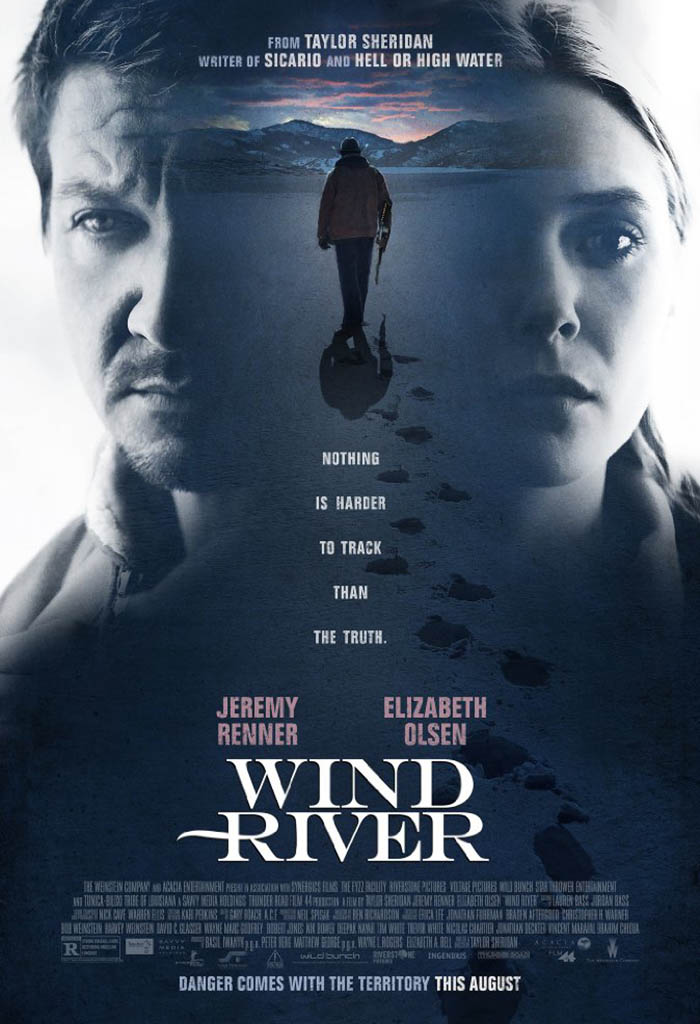It’s been a slow couple weeks for movies here in the waning days of summer. Most of the blockbusters have come and gone, and I’ve been craving something with a little more weight.
Wind River not only possesses that weight, but it has several very important things to say. On the surface, Wind River is the story of wildlife officer Cory Lambert and fledgling FBI agent Jane Banner’s investigation into the rape and murder of 18-year-old Natalie Hanson on the Wind River Arapahoe Indian Reservation in Wyoming (Warning: this movie deals with and briefly depicts sexual assault). That’s the plot. It’s a good one, but it’s something that could be found on any number of hour-long crime procedurals on television these days. No, what sets Wind River apart is its treatment of its subject matter and its myriad underlying themes.
Set amidst the wild and dangerous beauty of a snow-bound Wyoming, the backdrop serves as a stark contrast to the depravity of mankind. There is a pulsing undercurrent throughout the film, a mourning over the sins of America’s past, sins that have never been altogether buried, simply shoved aside and ignored. Those sins act as a lingering presence hovering over the shoulder of the viewer, haunting the duration of this film.
On a brief and less important note, everything this movie does it does well. Directing, cinematography, acting, everything. Featuring Jeremy Renner and Elizabeth Olsen, possibly two of the most underrated talents in Hollywood right now, and a script with particularly strong writing, Wind River’s greatest strength is not in the realm of the technical, but the fact that all of the technical aspects are bent and bowed in service to the greater purpose: the themes, the tone, and the story.
This movie isn’t about politics. It’s about right and wrong, good and evil, things that are entirely separate from the political sphere. At no point during this film did I cringe at a misguided or overtly political agenda. Anyone who cannot see or admit the wrongs perpetrated in the history of this country likely will not care for this film. But they are precisely the people who should watch it.
It is an unfortunate reality that many stories that wish to address the darkness end up succumbing to it. Wind River, in my opinion, is impressively able to escape this fate. It stands its ground and looks the darkness in the eye, but it doesn’t allow itself to become the darkness itself. This is a film that clearly displays the depravity of humankind – not whites, not blacks, not native-Americans. All people. But it also finds the glimmer of hope shining at the center of that darkness.
However, perhaps my personal favorite thing about Wind River is at some point, it leaves the subject of America behind, and focuses on the commonality between us all. It doesn’t get stuck in the frozen mud of politics or centuries old sins. It moves on from that, without ever forgetting it, and finds the common ground that exists between two broken-hearted human beings. At its heart, Wind River is a story about grief, about loss, about pain, and yes, about anger. Because when it comes to these things, we are all on a level playing field. And when it comes to good and evil, we could all do with being a little more angry at the injustice of the past and its grip on our present.
Wind River is a capable murder mystery, a well-written thriller, and a poignant commentary on the pain that comes with living in a world like this one. And it will draw a line in the snow, a line that will divide those who perpetrate evil and those who are willing to fight against it. Whether it’s parents grieving over the loss of a child, a man defending to the death a woman that he loves, or a white man sitting in the snow with his native-American friend so they both can mourn, that line exists. And we can cross it for precisely two reasons: either for the sake of violence, or to embrace one another.
#windriver
